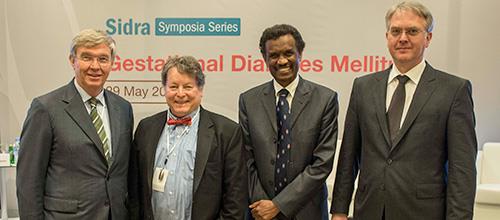Sidra Medicine hosted over 150 doctors, allied health professionals, students, and international experts for a medical symposium on diabetes during pregnancy, formally known as gestational diabetes mellitus (GDM), advocating for universal screening for GDM in pregnant women.
Dr. Joachim W. Dudenhausen, Deputy Chief Medical Officer for the Sidra Medicine and Professor of Obstetrics and Gynecology at Weill Cornell Medical College in Qatar, moderated the panel of international and local experts on GDM. The panel consisted of: Dr. Badreldeen Ahmed, Head of Feto-Maternal Center in Doha; Dr. Amos Grunebaum, Director of Obstetrics and Chief of Labor and Delivery and Director of Obstetric Patient Safety and Quality Improvement at Weill Cornell Medical Center in New York, U.S.; and Dr. Andreas Plagemann, Professor and Head of Division of ‘Experimental Obstetrics’ at the Obstetrics clinic at Charité University Medicine Berlin in Germany.
The symposium covered GDM management, screening, and treatment, as well as highlighting some important misconceptions about what may occur during pregnancy. Dr. Plagemann from the Charité University addressed the biggest misconception that many women have regarding nutritional needs during pregnancy: the perceived need to eat for two. This belief, Dr. Plagemann said, was incorrect and could lead to overeating, as well as neonatal overfeeding, which may lead to GDM.
“Overeating and overfeeding of the fetus, which occurs in one-third of pregnancies in Westernized countries, may lead to epigenetic programming of long-term risks for the newborn, such as developing the metabolic syndrome. Although an increase in appetite and weight gain is expected and is normal during the nine-month period, women should maintain a healthy weight increase and maintain a sufficient level of physical activity,” Dr. Plagemann stated during the symposium.
Gestational diabetes is an important disease to be aware of during pregnancy and, if left untreated, may worsen maternal and fetal outcomes. Dr. Grunebaum explained that treatment for GDM begins well before pregnancy by optimizing weight and includes proper diet, exercise, intensive monitoring of glucose levels, insulin and oral hypoglycemic medications, with most women responding to adequate changes in diet and exercise patterns.
Globally GDM affects two to 10 percent of pregnant women, which makes it the most prevalent health concern during pregnancy1. In Qatar, 6.4 percent of pregnant women suffer from GDM, with a higher prevalence in Qatari women2. Some studies also found that GDM is increasing in Qatar because of the increase in obesity, multiple births, and a family history of diabetes3. GDM usually develops during the 24th- 28th week of pregnancy, when the body is required to produce two to three times more insulin to balance the blood glucose level. If a pregnant woman’s body is not able to produce this required amount, then blood glucose levels increase, resulting in GDM. After a woman gives birth, blood glucose levels usually return to normal1.
Khalid Al Mohannadi, Sidra Medicine’s communications project director, said, “We selected the topic of GDM because of the prevalence of this condition globally and, in particular, in Qatar. As a specialty center for women’s and children’s health, Sidra Medicine’s role is to address those conditions that most affect the women and children of this region. This has been another important symposium that will help to improve the care we offer.”
The GDM symposium marked the fourth event of the Sidra Medicine Symposia Series, a quarterly medical conference that is hosted and organized by the Sidra Medicine. The Series is designed to address the most important topics facing women’s and children’s healthcare to the medical community and to share medical knowledge, research, and the best practices.


